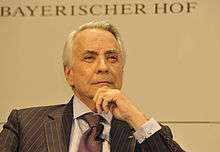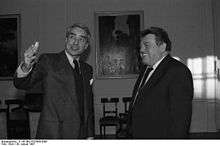Richard Burt
| Richard R. Burt | |
|---|---|
 | |
| United States Ambassador to Germany | |
|
In office September 16, 1985 – February 17, 1989 | |
| President | Ronald Reagan |
| Preceded by | Arthur F. Burns |
| Succeeded by | Vernon A. Walters |
| Personal details | |
| Born |
February 3, 1947 Sewell, Chile |
| Alma mater |
Cornell University Tufts University |
Richard R. Burt (born February 3, 1947) is an American businessman and diplomat who served as United States Ambassador to Germany and was a chief negotiator of the Strategic Arms Reduction Treaty. Prior to his diplomatic career, Burt worked as director of a non-governmental organization and was a correspondent for The New York Times.
Early life and education
Burt was born on February 3, 1947 in Sewell, Chile.[1] He attended Cornell University, where he was a member of Alpha Delta Phi.[2] He earned his bachelor's degree, and earned a master's degree in international relations from the Fletcher School of Law and Diplomacy at Tufts University in 1971. Following graduate school, he was selected for a research fellowship at the United States Naval War College. Following this fellowship, Burt moved to London to work as a research associate and later Assistant Director of the International Institute of Strategic Studies. In 1977, he was hired by The New York Times to work as a correspondent on national security issues.[3]
Career

Burt began working for the United States Department of State in the early 1980s. In 1981, he was appointed Director of Politico-Military Affairs, and in 1983 Assistant Secretary of State for European and Canadian Affairs. In 1985, he became the United States Ambassador to Germany.[3] His tenure as Ambassador to Germany coincided with the beginning of the process that would lead to the reunification of Germany.[4] In 1989, President George H.W. Bush appointed Burt as chief negotiator for the Strategic Arms Reduction Treaty (START I) between the United States and the Soviet Union, with the rank of ambassador.[1][3] The treaty, signed in 1991, limited the number of nuclear weapons that the two countries could have.
After negotiation of the START I treaty, Burt left government service and entered the private sector. He has since worked as a partner in consulting firms McKinsey and Company, Diligence, and McLarty Associates. In addition, he has served on boards for Deutsche Bank's Scudder and Germany mutual fund families, America Abroad Media,[5] International Games Technology, UBS mutual funds, Textron Corporation, and the senior advisory board of Russian Alfa-Bank. Burt is also a Senior Advisor to the Center for Strategic and International Studies[3] and U.S. Chair of Global Zero.[6] He has lobbied on behalf of LOT Polish Airlines, the Capital Bank of Jordan, and Ukrainian construction firm TMM.[7][8]
In 2014, Burt served as an unpaid foreign policy advisor for Rand Paul's campaign for president.[9][10]
During the first two quarters of 2016, Burt's firm received $365,000 to lobby for New European Pipeline AG, a firm owned by Russian oil company Gazprom.[7] Beginning in February 2016, he and a colleague lobbied for Nord Stream II, an expansion of the Nord Stream pipeline which would allow Russian gas to reach Europe without going through Belarus or Ukraine. During the same time, Burt became an advisor for the presidential campaign of Donald Trump.[11] He encouraged Trump to take a less interventionist approach to foreign affairs[12] and helped craft Trump's first major foreign policy speech at the think tank Center for the National Interest on April 27, 2016. In the speech, Trump called for greater cooperation with Russia. During the campaign, Burt also wrote white papers for Jeff Sessions on foreign policy and national security. Burt's simultaneous roles as a campaign adviser for Trump and a lobbyist for Russian interests first drew scrutiny in October 2016 following the revelations of other connections between the campaign and Russia.[7]
References
- 1 2 "Nomination of Richard R. Burt for the Rank of Ambassador While Serving as United States Negotiator for Strategic Nuclear Arms". The American Presidency Project. February 2, 1989. Retrieved 2009-11-14.
- ↑ The Alpha Delta Phi Fraternity: Among Our Brotherhood, archived from the original on 24 September 2009, retrieved 15 February 2015 )
- 1 2 3 4 "Richard R. Burt". Council of American Ambassadors. Archived from the original on 2010-09-17. Retrieved 2009-11-14.
- ↑ "Richard R. Burt". Center for Strategic and International Studies. Retrieved 2009-11-14.
- ↑ http://americaabroadmedia.org/user/35/Richard_Burt
- ↑ http://www.globalzero.org/en/who/richard-burt
- 1 2 3 Schreckinger, Ben; Ioffe, Julia (October 7, 2016). "Lobbyist advised Trump campaign while promoting Russian pipeline". Politico.
- ↑ "Все о компании ТММ: история, менеджмент, награды и философия". tmm.ua.
- ↑ Costa, Robert (March 27, 2014). "Rand Paul building national network, courting mainstream support for presidential bid". Washington Post.
- ↑ Kirchick, James (May 9, 2014). "Is Rand Paul a Secret Hawk? Or Maybe Not a Total Dove?". The Daily Beast.
- ↑ Kirchick, James (April 27, 2016). "Donald Trump's Russia connections". Politico.
- ↑ Hosenball, Mark (June 8, 2017). "Former Reagan aide helped write Trump foreign policy speech". Reuters.
External links
| Government offices | ||
|---|---|---|
| Preceded by Reginald Bartholomew |
Director of the Bureau of Politico-Military Affairs January 23, 1981 – February 17, 1982 |
Succeeded by Jonathan Howe |
| Preceded by Lawrence Eagleburger |
Assistant Secretary of State for European and Canadian Affairs February 18, 1983 – July 18, 1985 |
Succeeded by Rozanne L. Ridgway |
| Diplomatic posts | ||
| Preceded by Arthur F. Burns |
United States Ambassador to Germany 1985–1989 |
Succeeded by Vernon A. Walters |